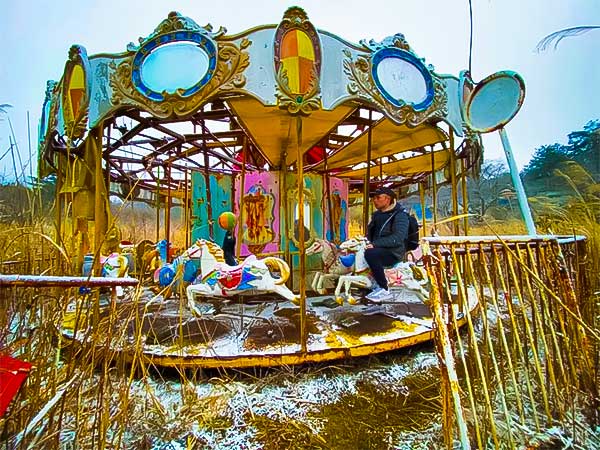
At that time in June it never quite gets dark. Even in the middle of the night the sky glows and only the very brightest stars are visible. I found myself driving down to join the motorway under a cloudless, blue dome. There were only a few other vehicles out on the road. The only talk-radio station I could find was broadcasting a programme on the future of the economy. It soon got on my nerves, so I switched to listening to an album I’d downloaded. Ornette Coleman. Occasionally, I passed a lay-by. Every one of them was full of articulated lorries, their drivers preparing to spend the night in their dimly-lit cabs. It didn’t take me long to get to the motorway junction. In the subdued light, the trees planted on the soft estate around it could almost be mistaken for a real forest.
The service station I was heading for was less than a mile down the carriageway. When I got there, the car park was pretty empty. I parked up and went in.
I made my way through the tiled concourse, heading for the coffee bar. Almost all the shops were shut. An amusement arcade was open but empty. Flashing lights zigzagged across the screens of unattended gambling machines. A vending machine stood silent, its transparent plastic body full of blue and pink cuddly toys. Tape barriers blocked the entrance to a small supermarket where a woman in a uniform the colour of the shop sign was mopping the floor. The coffee bar was still open, although there were only a few people there.
There was no queue at the counter. A lively young man served me with an espresso. I got the impression he was trying to suppress his amusement at something his colleague, a girl of about the same age, had just said to him before I arrived. I took my coffee over to a table by the panoramic window that ran the whole length of one wall, overlooking the motorway with its slow-moving, red and white lights. I phoned G.
#
The automatic doors slid apart. I stepped out into the night air and the endless rushing sound of the motorway traffic. I lit a cigarette. A young couple with two small children walked past me, going in. The doors hissed open again to admit them. I didn’t catch what he said, but as they went in I heard her say:
‘Don’t worry, I’ll get it sorted. I always do, don’t I?’
I looked up. Over the doorway a CCTV camera was directing its inert stare towards me.
I wasn’t sure what to do next. Delete that. It sounds like the sort of thing one might feel, the sort of thing you’d make up if you were making this up as you went along, but it doesn’t describe how I felt back then. Fact is, I didn’t want to do go home. Delete that, too. ‘Home’ isn’t a word I’d associate with the room in the shared house I was living in at the time. I much preferred the interior of my car and the liminal space – neither private nor totally impersonal – of a café, for example. And being by the motorway gave the impression that one was actually going somewhere even when one clearly wasn’t.
I tried to recall what I’d said to G. earlier. When I go to work these days I feel like one of those people who dress up in a white coat, stick a stethoscope in their pocket and walk into a hospital pretending to be a doctor. Does that make any sort of sense? I spoke the words outloud, reliving the conversation. Does that make any sort of sense?
I looked down at my feet, then looked up, taking in, as I did so, the tarmac that stretched away from me, punctuated by regular patterns of overhead lights and islands of stunted vegetation. There were still only a few cars parked in the delineated parking bays. I clicked my key-fob. Some distance away, across the tarmac, the lights on my car flashed on and off.
Stubbing my cigarette out under the sole of my shoe, I walked over. I climbed into the front seat and wound it back a little. I turned on the jazz.
.
Dominic Rivron
.

Enjoyed reading this Dominic .Thanks
Comment by Malcolm Paul on 24 August, 2025 at 6:36 am